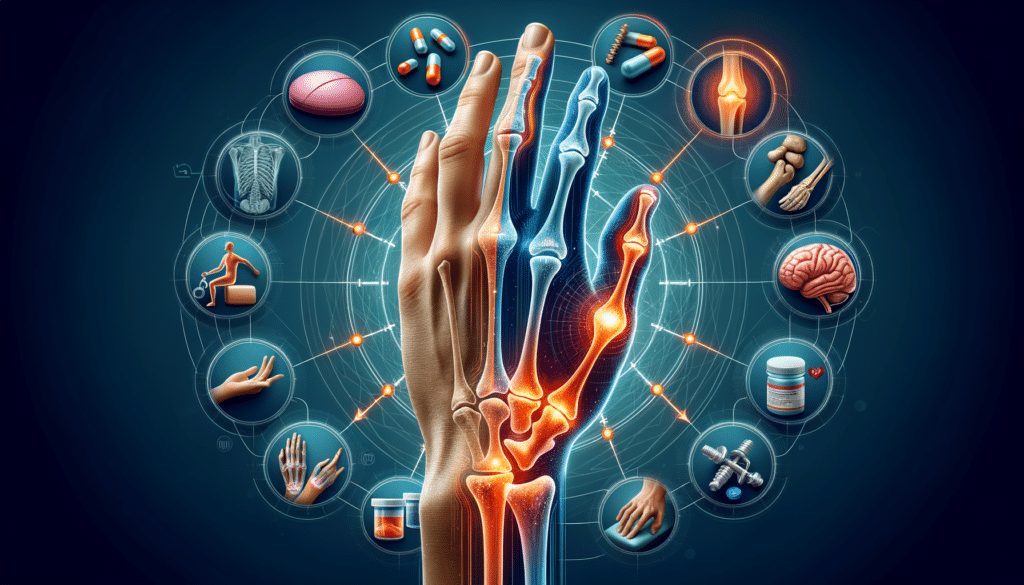Introduction to Arthritis and Its Impact
Arthritis is a common condition that affects millions of individuals worldwide, causing joint pain and stiffness. It encompasses over 100 different types, with osteoarthritis and rheumatoid arthritis being the most prevalent. Understanding the nature of arthritis and its impact on daily life is crucial for managing its symptoms effectively. Arthritis can lead to decreased mobility, affecting the ability to perform everyday tasks. The pain and discomfort associated with arthritis can also impact mental health, leading to frustration and a decreased quality of life. By exploring various treatment options, individuals can find relief and improve their overall well-being.
Conventional Medical Treatments
Conventional medical treatments for arthritis joint pain focus on reducing inflammation and alleviating pain. Nonsteroidal anti-inflammatory drugs (NSAIDs) are commonly prescribed to manage pain and reduce swelling. These medications, while effective, can have side effects such as stomach irritation and increased risk of cardiovascular issues. Corticosteroids are another option, often used for short-term relief due to potential long-term side effects. Disease-modifying antirheumatic drugs (DMARDs) are specifically used for rheumatoid arthritis, aiming to slow disease progression and preserve joint function. Biologic response modifiers, a newer class of DMARDs, target specific components of the immune system to reduce inflammation. It is important for patients to work closely with their healthcare providers to determine the most suitable treatment plan, considering both benefits and potential risks.
Alternative and Complementary Therapies
Alternative and complementary therapies offer additional options for managing arthritis joint pain. These approaches focus on holistic well-being and can be used alongside conventional treatments. Acupuncture, an ancient Chinese practice, involves inserting thin needles into specific points on the body to alleviate pain. Studies have shown that acupuncture can be beneficial for some individuals with arthritis. Massage therapy is another alternative treatment that can help reduce muscle tension and improve circulation, providing relief from pain and stiffness. Herbal supplements, such as turmeric and ginger, are also popular due to their anti-inflammatory properties. However, it is essential to consult with a healthcare professional before starting any alternative therapies, as they may interact with prescribed medications or have side effects.
Lifestyle Modifications and Exercise
Adopting lifestyle modifications and incorporating exercise into daily routines can significantly impact arthritis management. Regular physical activity helps maintain joint function and flexibility, reducing pain and stiffness. Low-impact exercises such as swimming, cycling, and walking are recommended, as they are gentle on the joints. Strengthening exercises can also help support the joints by building muscle around them. Weight management is crucial, as excess weight can put additional strain on the joints, exacerbating arthritis symptoms. A balanced diet rich in anti-inflammatory foods, such as fruits, vegetables, and omega-3 fatty acids, can also support joint health. By making these lifestyle changes, individuals can improve their overall quality of life and better manage their arthritis symptoms.
Innovative Treatments and Future Directions
Innovative treatments for arthritis are continuously being researched and developed, offering hope for improved management and outcomes. Stem cell therapy is a promising area of research, aiming to regenerate damaged joint tissue and reduce inflammation. Platelet-rich plasma (PRP) injections, which use a concentration of a patient’s own platelets, are also being explored for their potential to promote healing and reduce pain. Advances in biologic medications continue to enhance treatment options for rheumatoid arthritis, targeting specific pathways in the immune system. As research progresses, these innovative therapies may become more accessible, providing new avenues for individuals seeking relief from arthritis joint pain. Staying informed about these developments and consulting with healthcare professionals can help patients make informed decisions about their treatment options.





